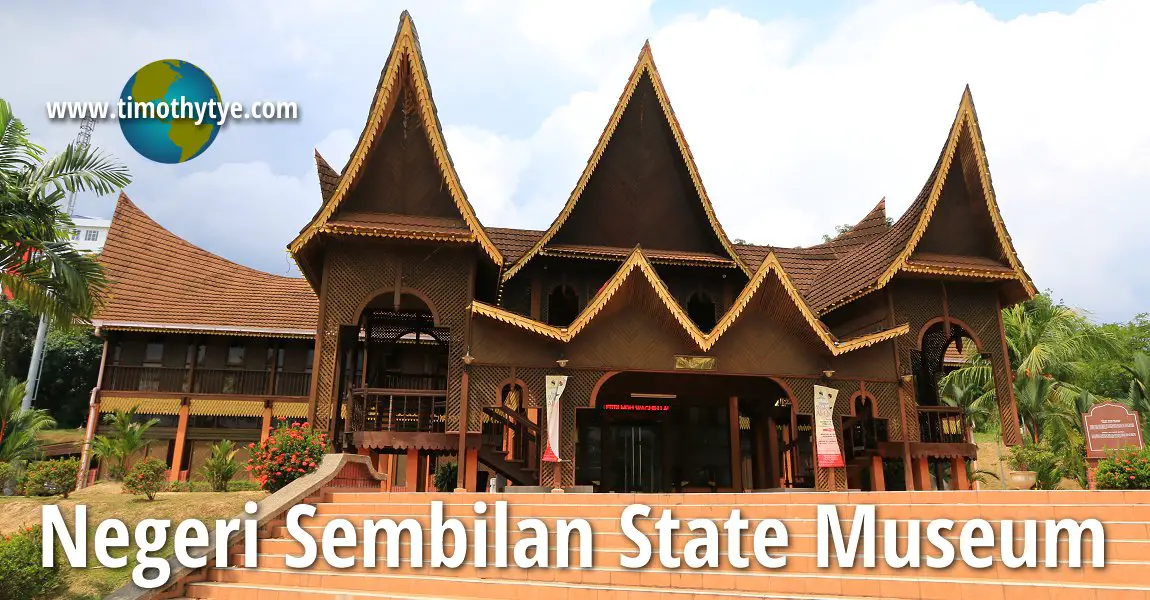 Negeri Sembilan State Museum, Seremban (9 July, 2016)
Negeri Sembilan State Museum, Seremban (9 July, 2016)
Negeri Sembilan State Museum (GPS: 2.71825, 101.92054) is a complex of buildings in Seremban that also serves as the Negeri Sembilan Cultural Arts Centre. Located on Jalan Sungai Ujong, the museum offers a fascinating insight into the local culture which is steep in the Minangkabau tradition.
The architecture of the Negeri Sembilan Cultural Arts Centre reflects Minangkabau architecture, with its roof ridges that curve upwards. This is supposed to resemble the horns of the buffalo.
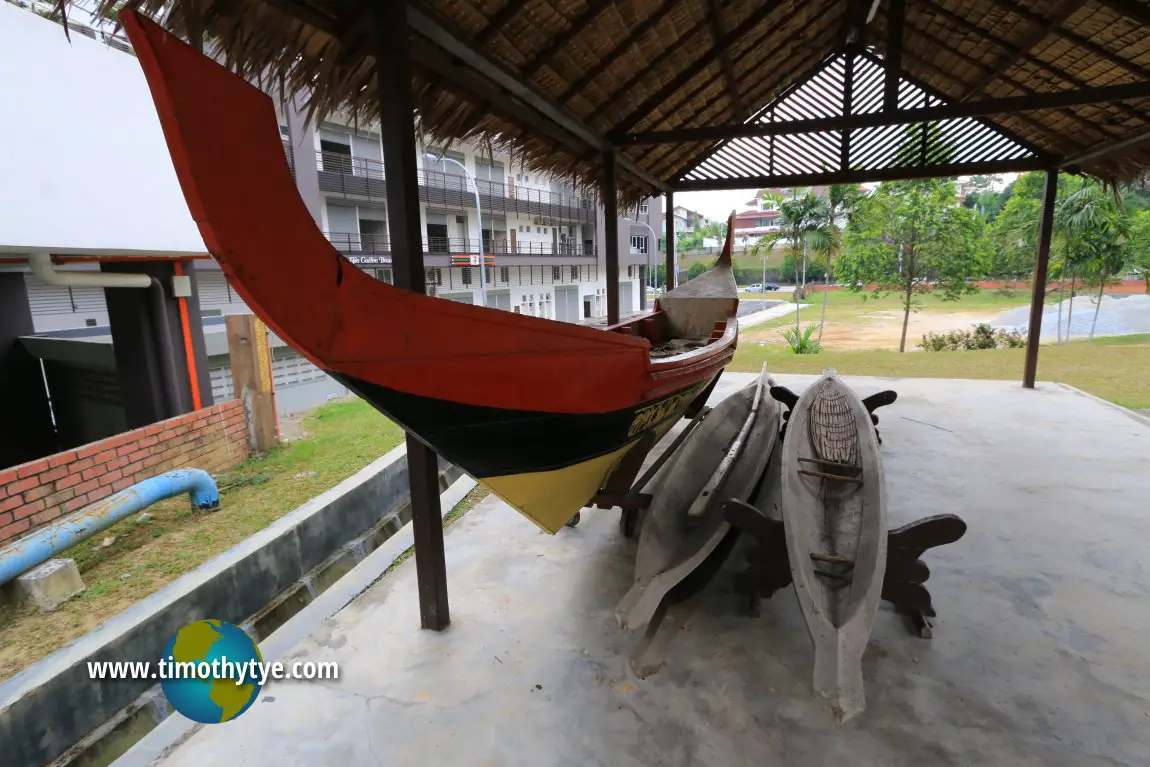 Old boats in the compound of the Negeri Sembilan State Museum (9 July, 2016)
Old boats in the compound of the Negeri Sembilan State Museum (9 July, 2016)
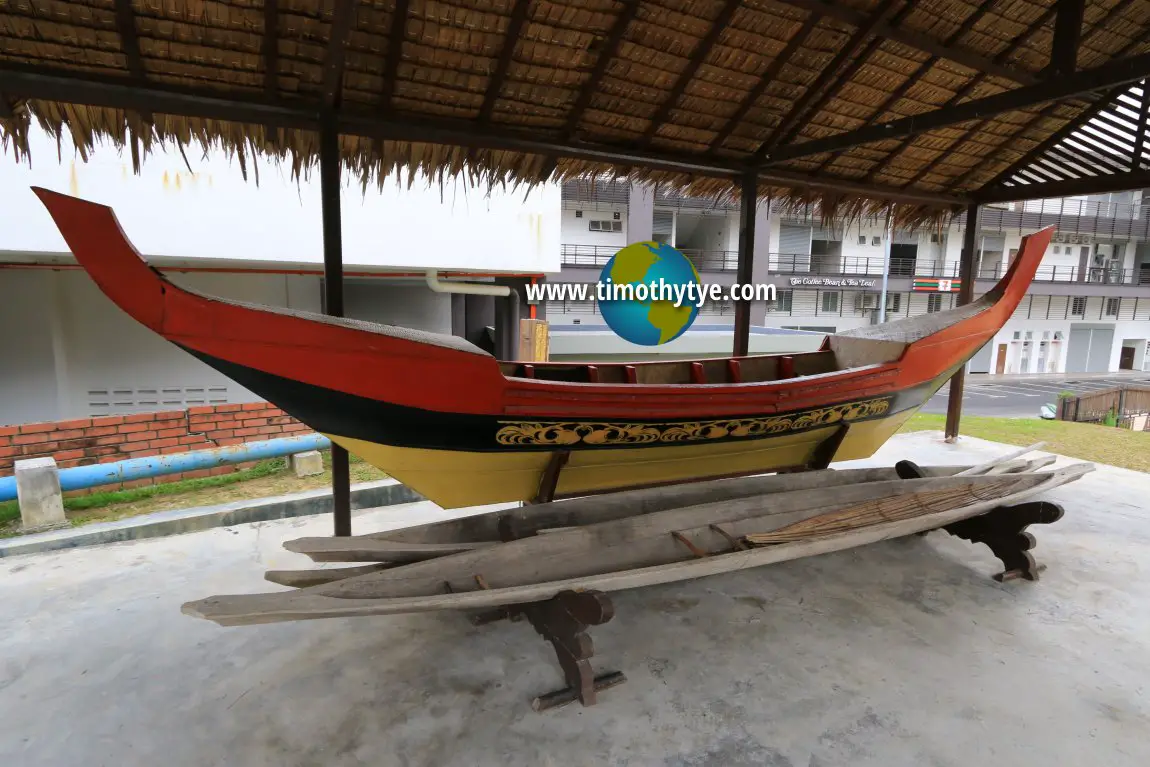 Another view of the old boats. (9 July, 2016)
Another view of the old boats. (9 July, 2016)
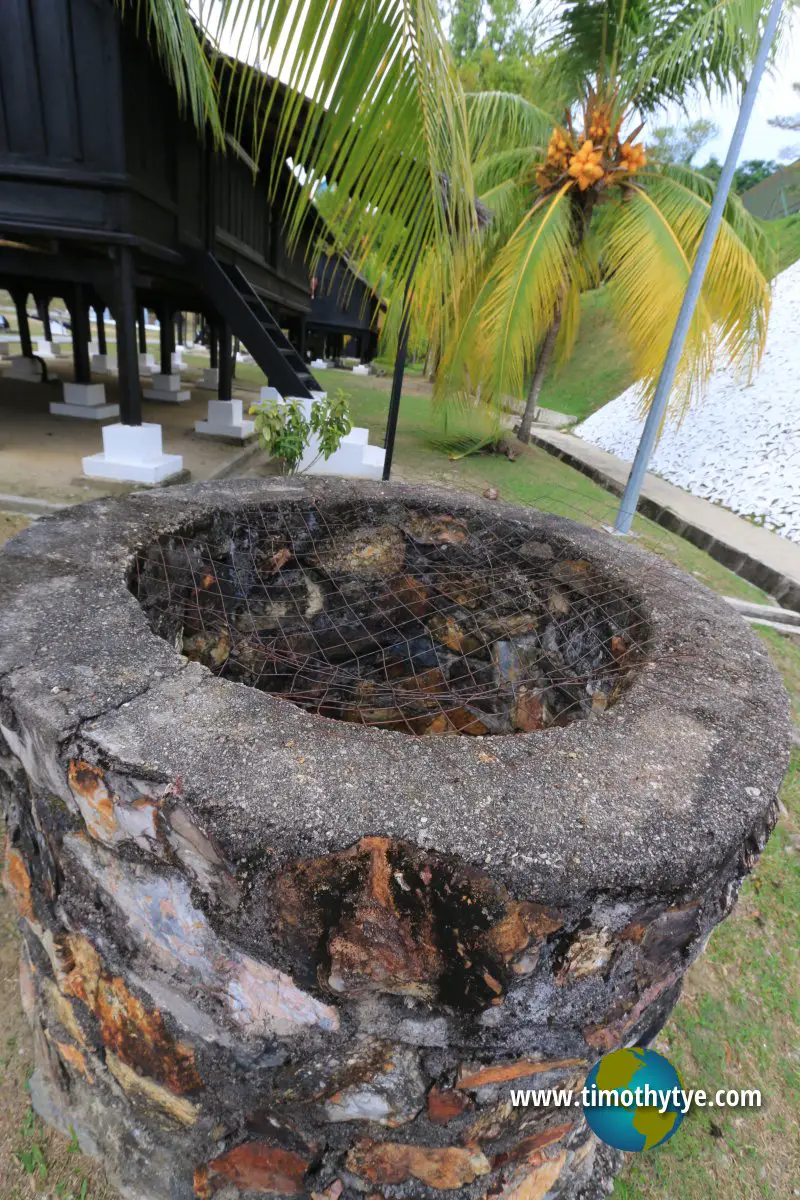 An old well at the Negeri Sembilan State Museum. (9 July, 2016)
An old well at the Negeri Sembilan State Museum. (9 July, 2016)
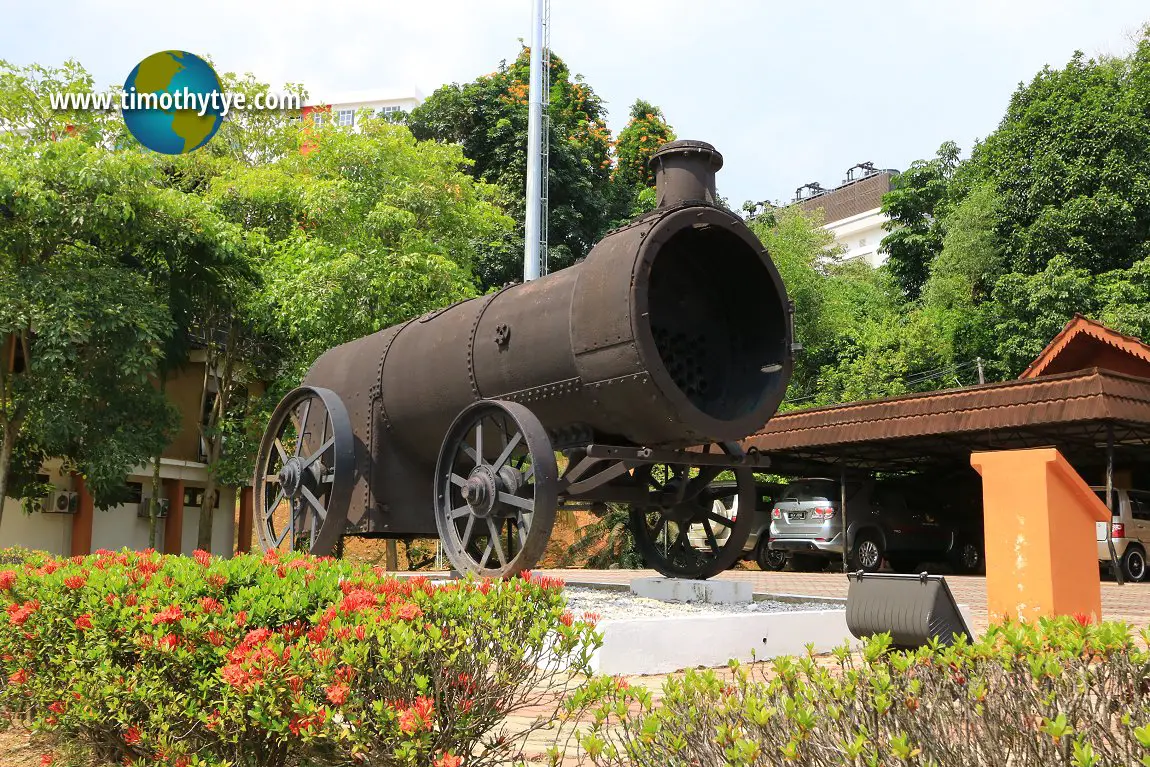 Old train engine outside the Negeri Sembilan State Museum. (9 July, 2016)
Old train engine outside the Negeri Sembilan State Museum. (9 July, 2016)
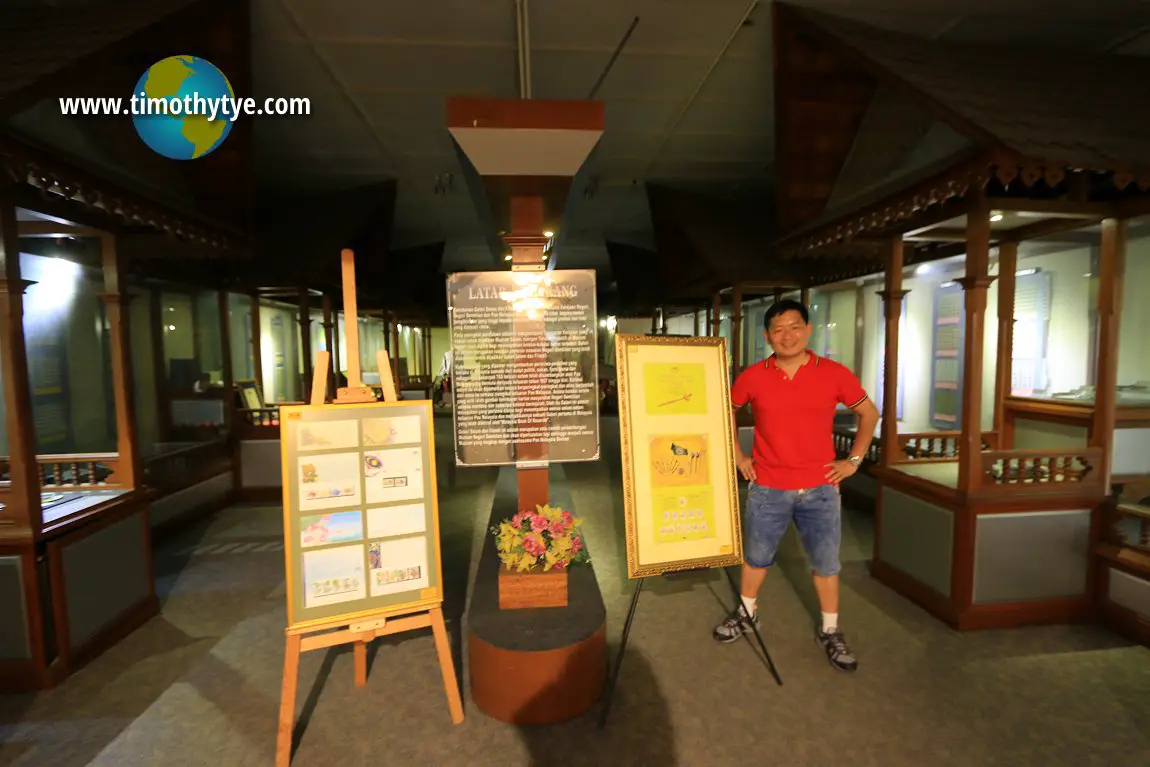 Galleries inside the Negeri Sembilan State Museum. (9 July, 2016)
Galleries inside the Negeri Sembilan State Museum. (9 July, 2016)
Taman Seni Budaya
Taman Seni Budaya Negeri Sembilan or Negeri Sembilan Cultural Park is a park within the Negeri Sembilan State Museum complex that showcases buildings of historic nature of the state. They include restored historic buildings that have been relocated to the site, to make it easier for visitors to view and appreciate them in one spot. The cultural park was officiated by Dato Mohd Isa, the Menteri Besar of Negeri Sembilan, on 8 July, 1986.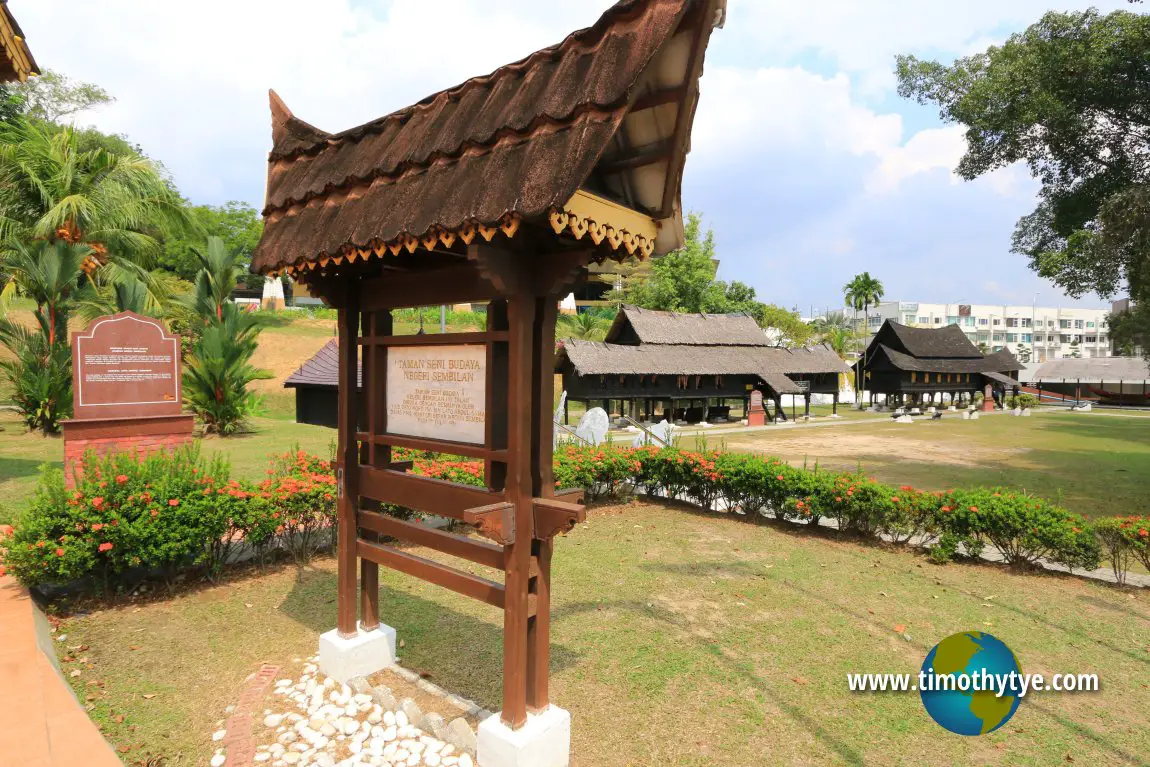 Taman Seni Budaya Negeri Sembilan (9 July, 2016)
Taman Seni Budaya Negeri Sembilan (9 July, 2016)
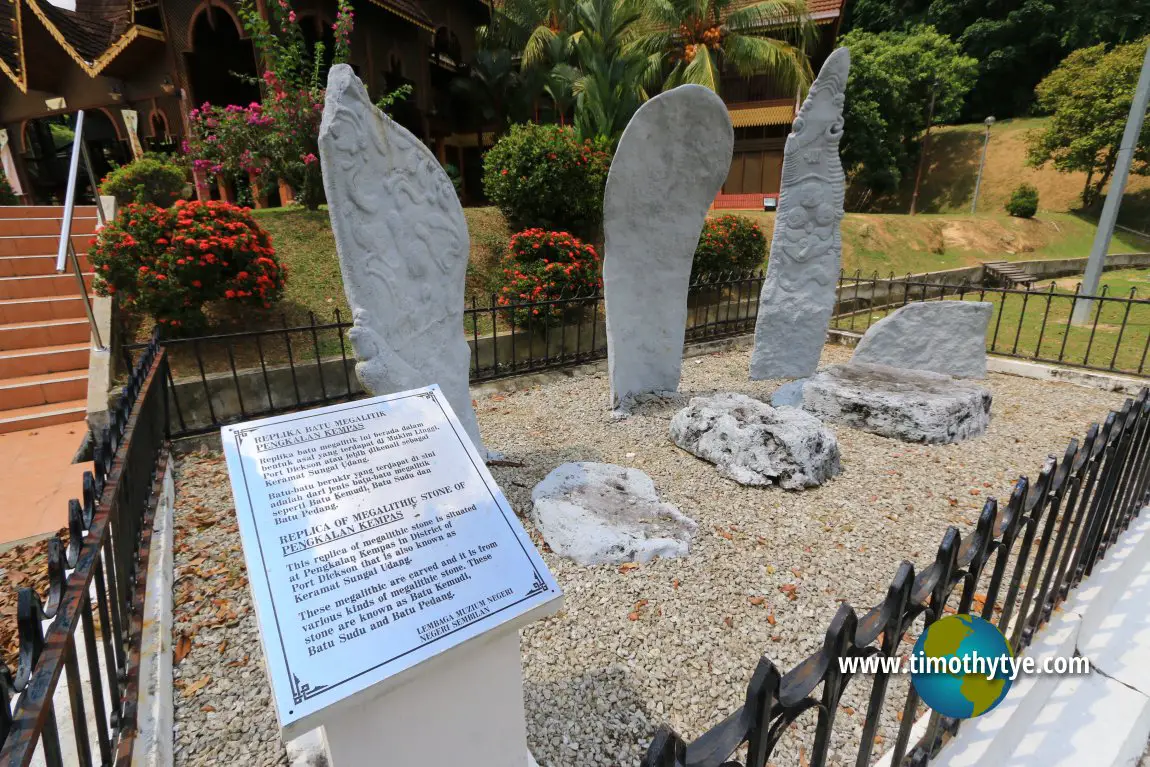 Replicas of the Pengkalan Kempas Megaliths (9 July, 2016)
Replicas of the Pengkalan Kempas Megaliths (9 July, 2016)
One of the sights at the cultural park is the replica of the Pengkalan Kempas Megaliths. You can tell quite easily that these are replicas. Compare them to the real thing on my webpage about the Pengkalan Kempas Megaliths.
Istana Ampang Tinggi
Istana Ampang Tinggi is a 19th century palace. It was built by Yam Tuan Ulin, who was the fifth Yang di-Pertuan Besar Negeri Sembilan. Yam Tuan Ulin ruled Negeri Sembilan from 1861 until 1869. Originally located in an area overlooking a wide expanse of rice fields, the palace was dismantled and relocated to Seremban in 1953, with the blessing of the 8th Yam Tuan, Tunku Abdul Rahman. When the Taman Seni Budaya was being established in 1980, the building was dismantled again, and relocated there. On 18 February, 2013, it was recognised as a heritage building under the National Heritage Act 2005.I remember it was such a challenge trying to photograph this building. The wood is very dark in colour, so photos of it tend to be underexposed. I have to adjust the exposure compensation of my camera in order to be able to photograph the istana nicely. I could see that during our visit, the roofing of the building has just been replaced, as it looked brand new.
There was no air conditioning inside the house, so it was very, very hot when we went inside. I could not imagine how one could stay indoors during the day time. In Negeri Sembilan, there is a law forbidding commoners from copying the design of palaces. Such building designs were reserved for the heirs.
In Rembau, for example, there were specific prohibitions, such as, commoners were not allowed to have two porches to their houses, they could not copy the type of carvings on the Istana Seri Menanti, they were not allowed to build columns that do not touch the ground, and screens of their houses should not be over two storeys tall.
The building is open for visitation from 10:00am to 6:00pm Mondays to Sundays, with a recess period from 12:15pm to 2:45pm on Fridays for the Friday prayers.
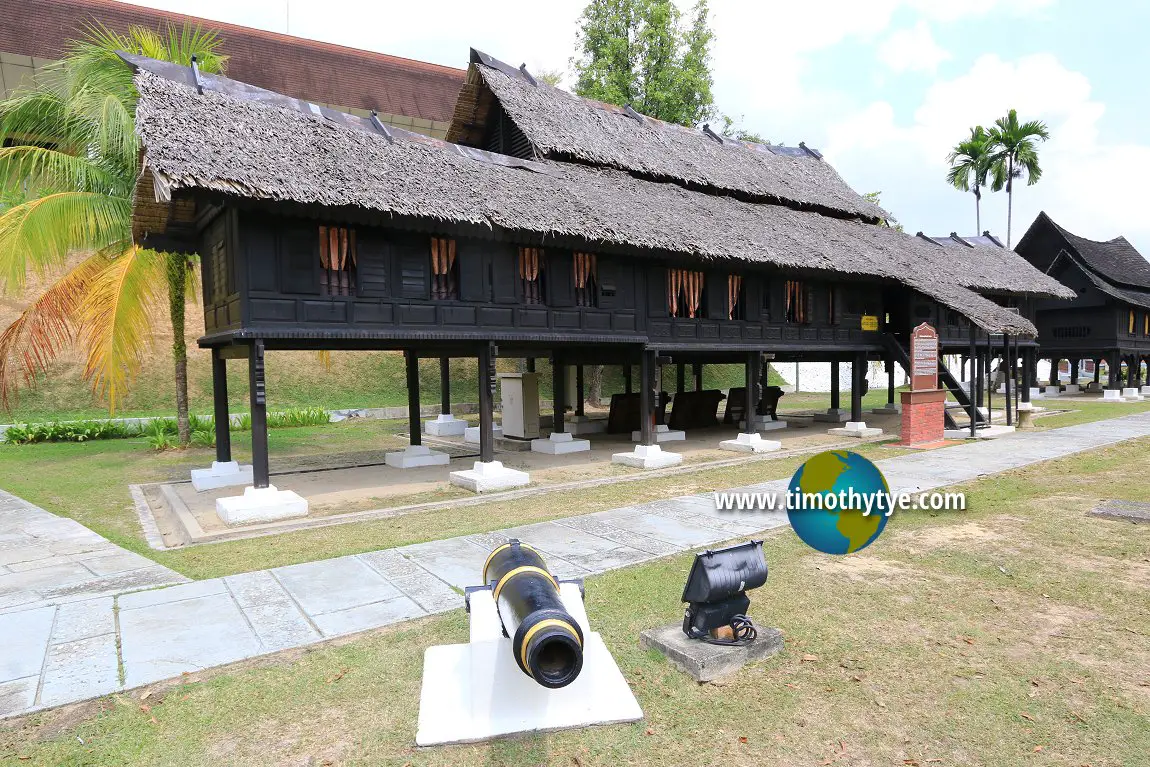 Istana Ampang Tinggi (9 July, 2016)
Istana Ampang Tinggi (9 July, 2016)
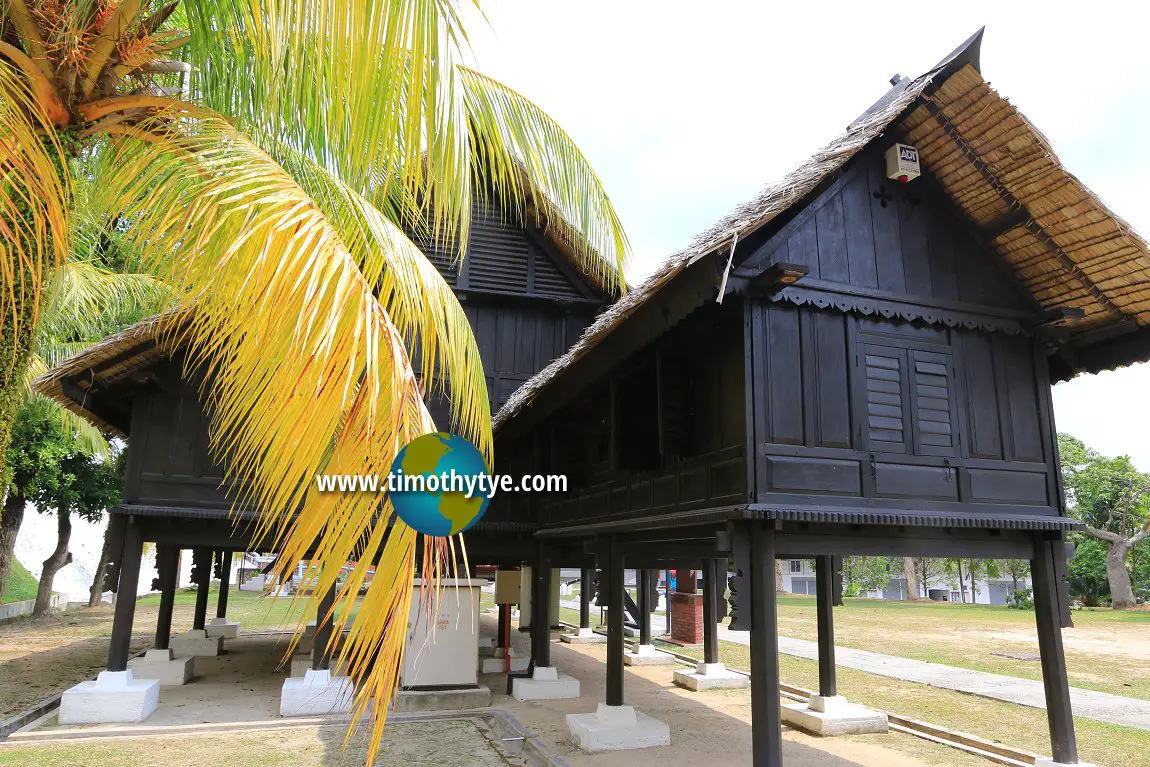 Front view of Istana Ampang Tinggi (9 July, 2016)
Front view of Istana Ampang Tinggi (9 July, 2016)
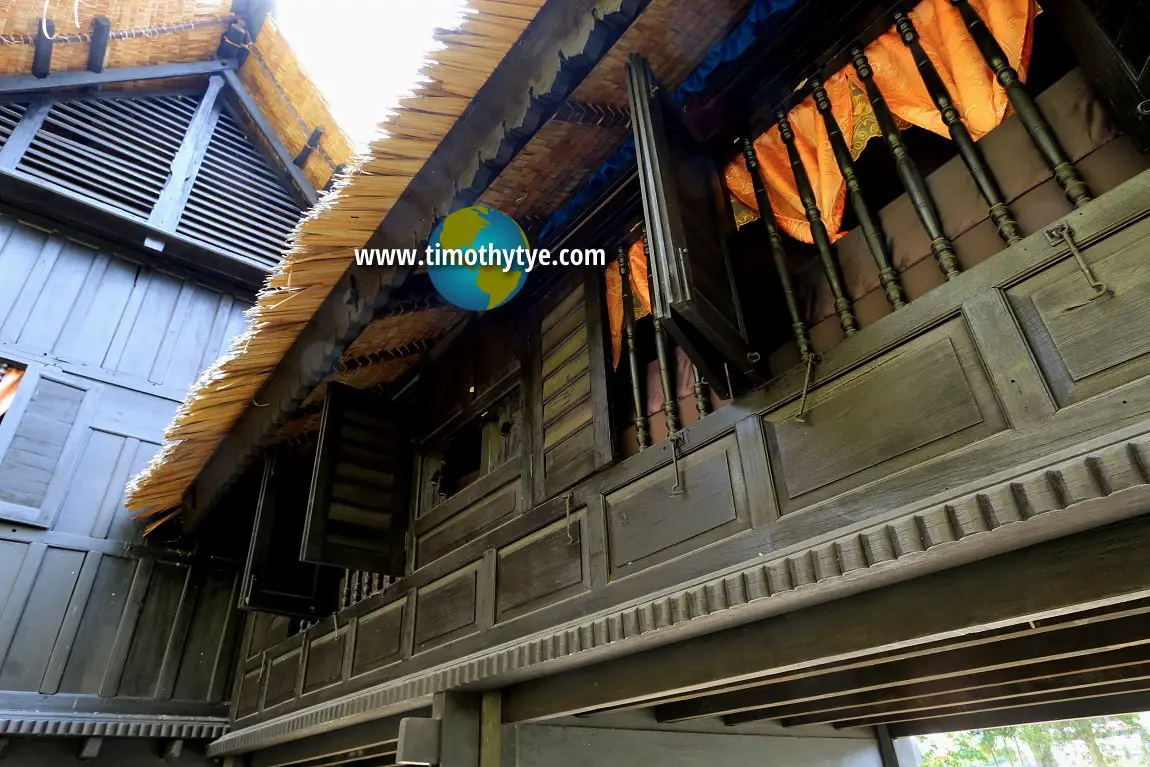 The beautifully carved wooden panels and grills of Istana Ampang Tinggi (9 July, 2016)
The beautifully carved wooden panels and grills of Istana Ampang Tinggi (9 July, 2016)
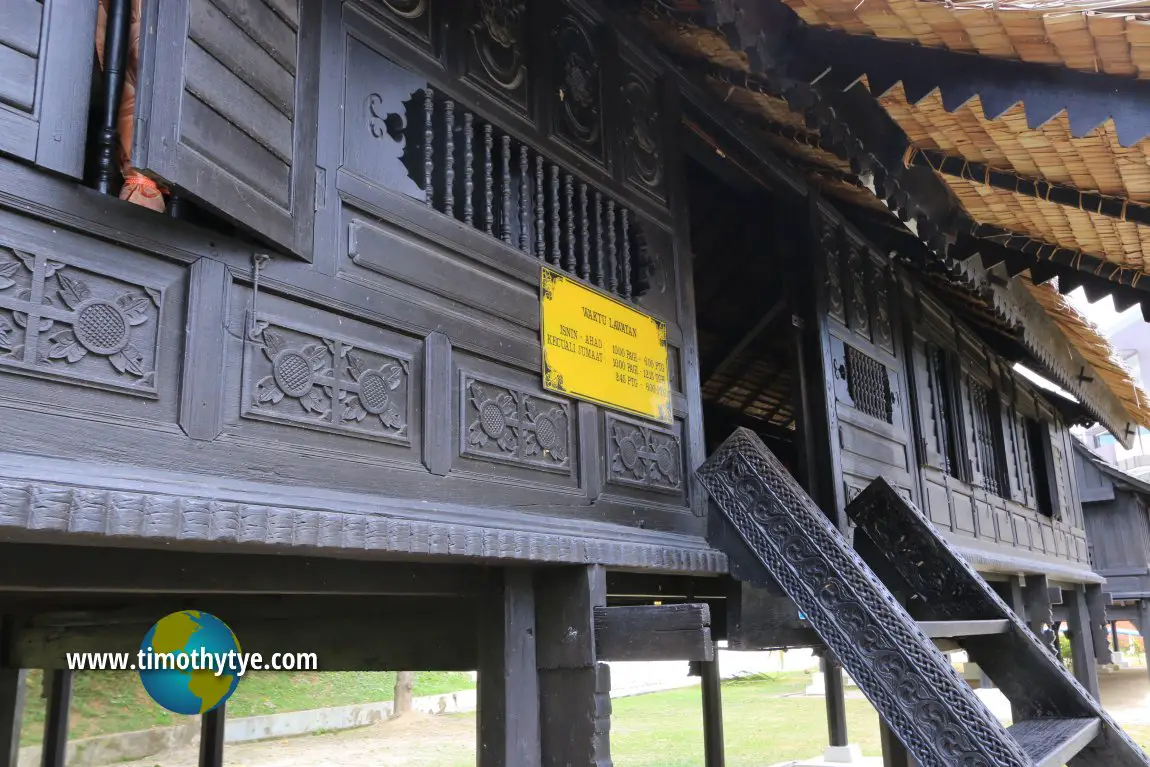 Entrance to Istana Ampang Tinggi (9 July, 2016)
Entrance to Istana Ampang Tinggi (9 July, 2016)
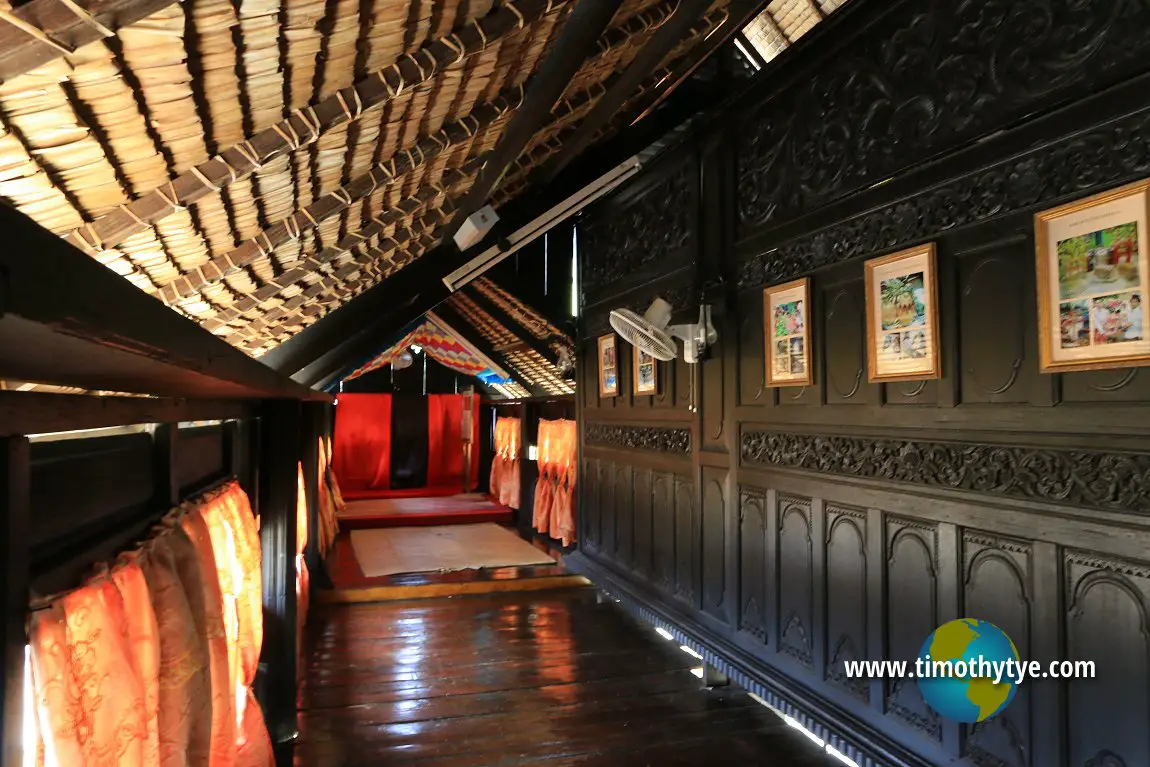 The interior of Istana Ampang Tinggi - it was a hot day, and this is really a hot house inside! (9 July, 2016)
The interior of Istana Ampang Tinggi - it was a hot day, and this is really a hot house inside! (9 July, 2016)
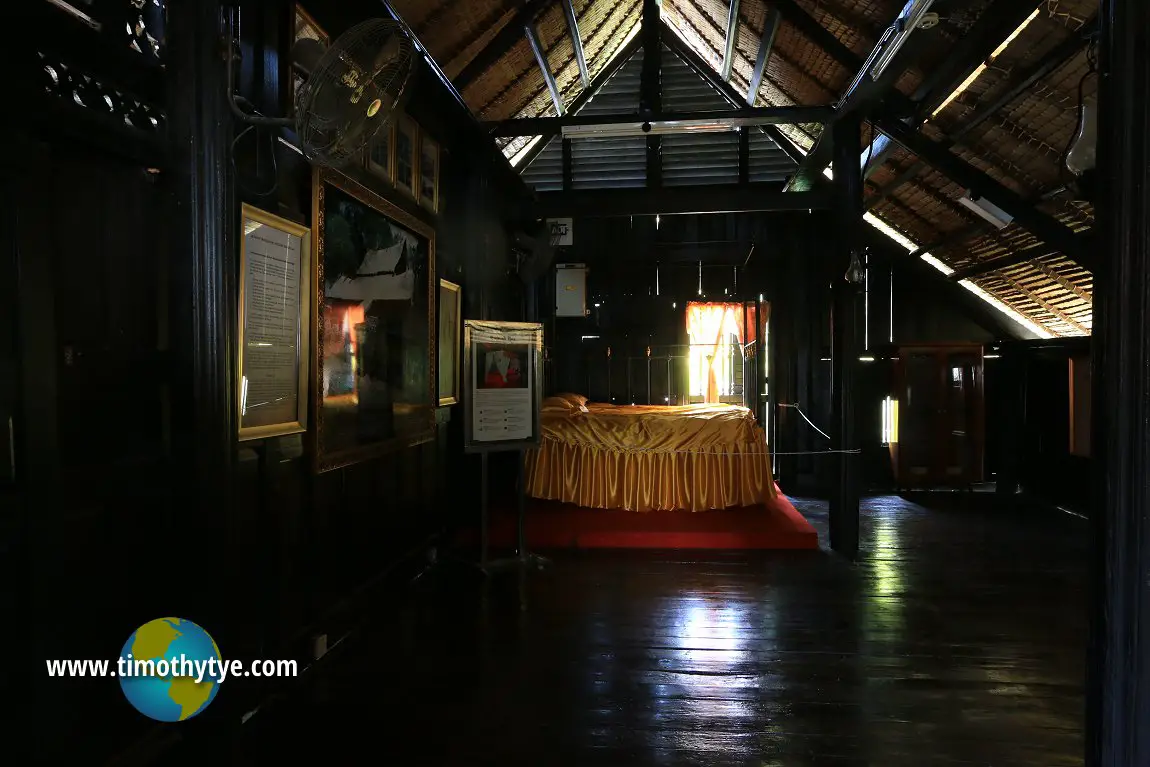 The main portion of the house, or rumah ibu of Istana Ampang Tinggi. Where there is a wedding, the bridal chamber is installed here. (9 July, 2016)
The main portion of the house, or rumah ibu of Istana Ampang Tinggi. Where there is a wedding, the bridal chamber is installed here. (9 July, 2016)
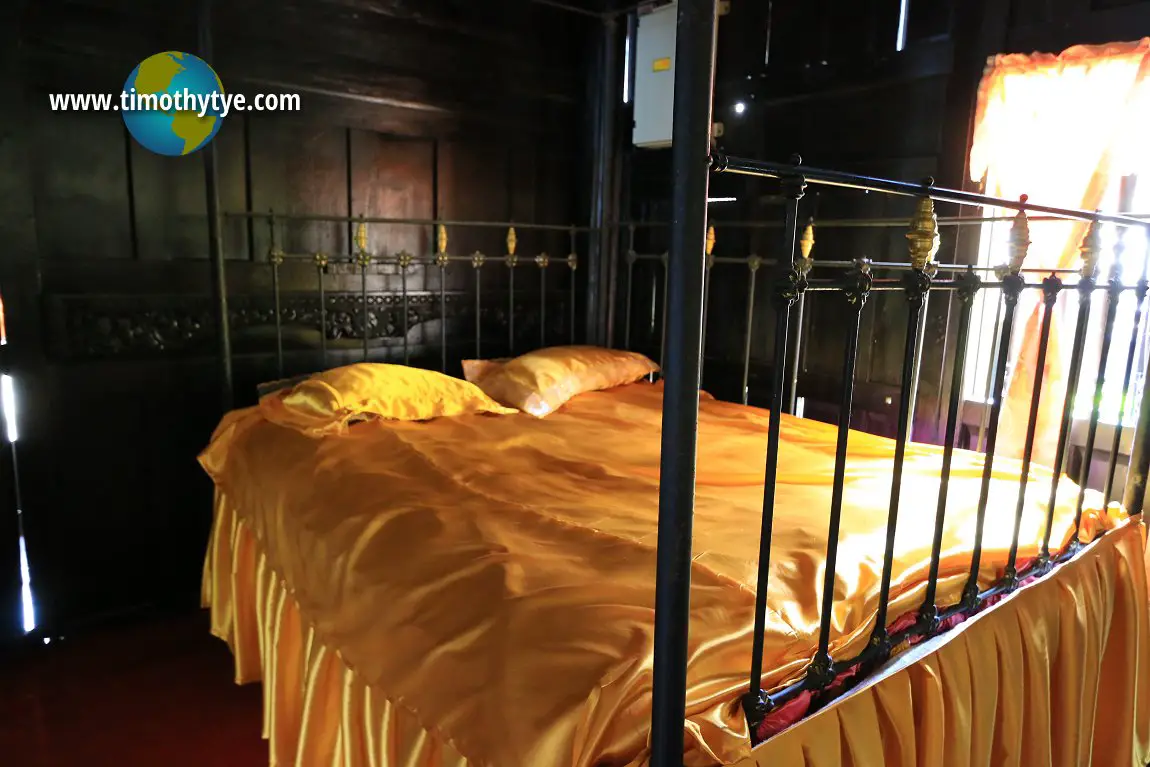 The royal bed at Istana Ampang Tinggi (9 July, 2016)
The royal bed at Istana Ampang Tinggi (9 July, 2016)
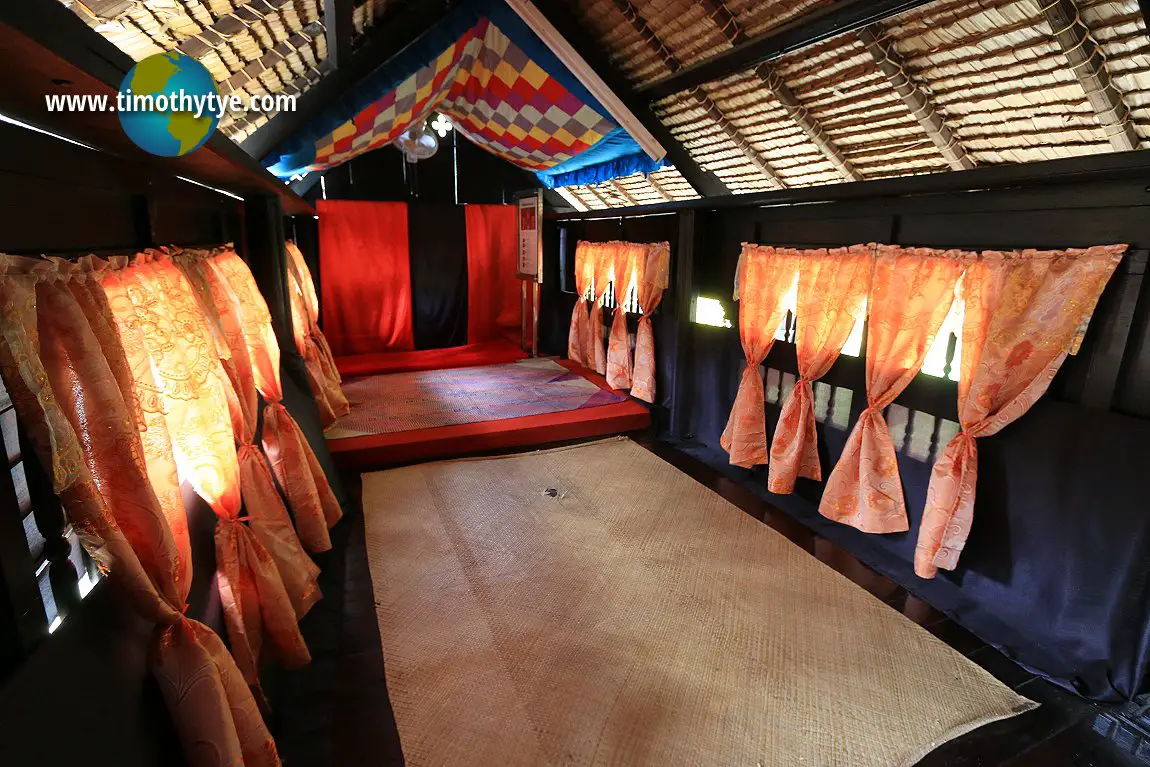 The "living room" inside Istana Ampang Tinggi (9 July, 2016)
The "living room" inside Istana Ampang Tinggi (9 July, 2016)
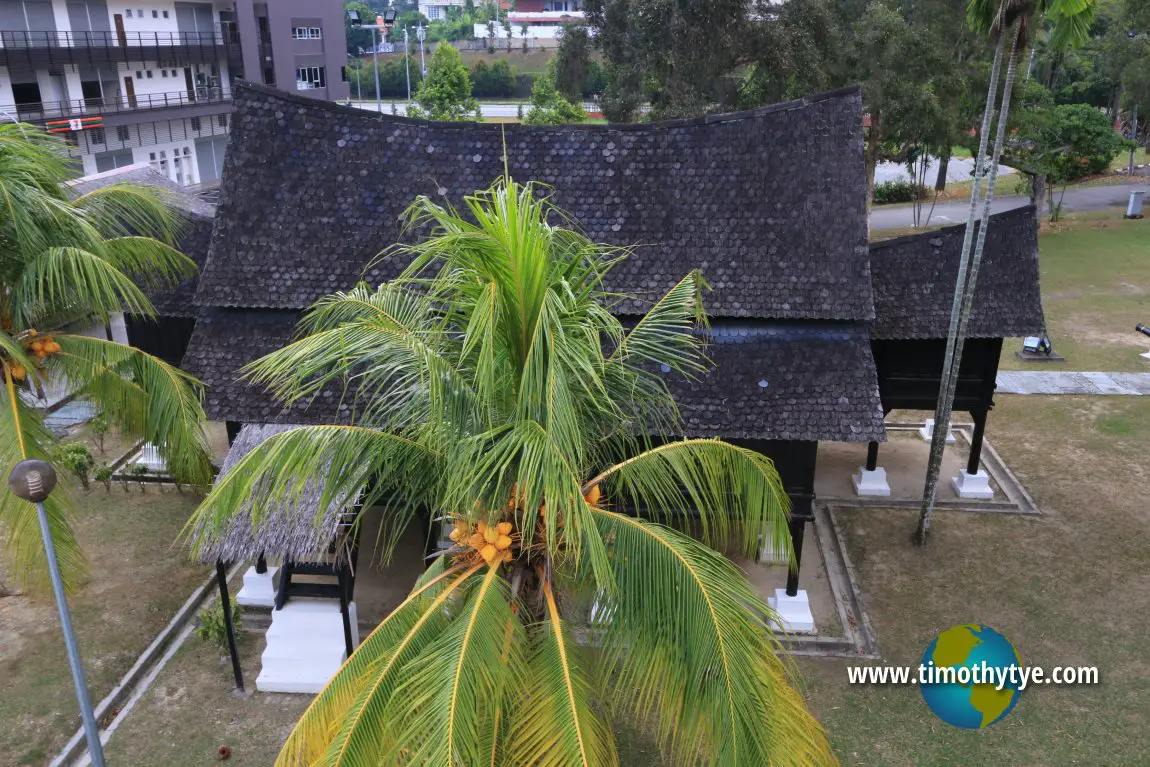 View of Istana Ampang Tinggi from above. (9 July, 2016)
View of Istana Ampang Tinggi from above. (9 July, 2016)
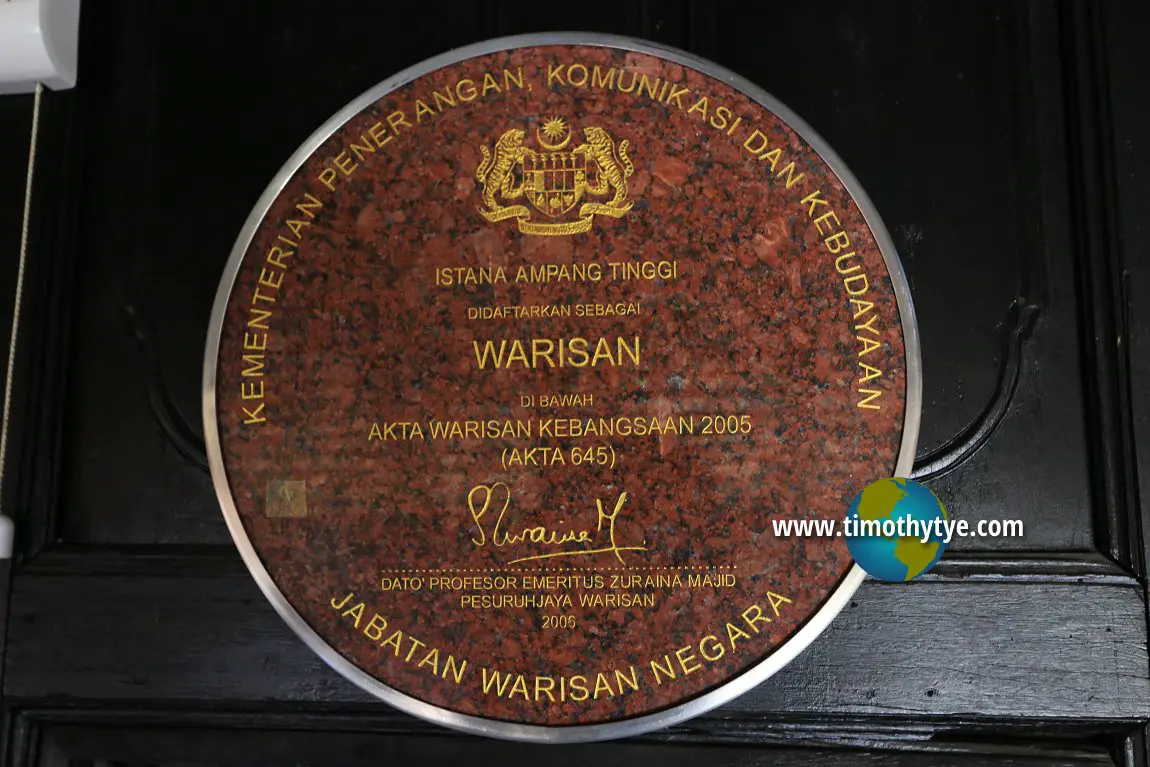 The plaque gazetting Istana Ampang Tinggi as a heritage building. (9 July, 2016)
The plaque gazetting Istana Ampang Tinggi as a heritage building. (9 July, 2016)
Model Rumah Melayu Negeri Sembilan
Model Rumah Melayu Negeri Sembilan or "Negeri Sembilan Malay Model House" is a heritage building from the early part of the 19th century. It was called a "model house" because it was once dismantled and brought to London to be shown at the British Empire Exhibition in 1924.The house was originally owned by a nobleman by the name of Tengku Saiyed Ismail bin Tengku Saiyed Abdul Rahman, who held the title of Dato' Kelana Sungai Ujong. His wife is called Cik Kundur Anak Wan Jaebah. It was originally sited at Mambau, which is about 4 miles from Seremban in the direction of Port Dickson. We even know the name of the builders, which were two Minangkabau men by the name of Haji Syahahbudin and Kamaruddin, who were siblings.
The Negeri Sembilan Malay Model House was gazetted as a heritage building under the National Heritage Act 2005 on 18 February, 2013.
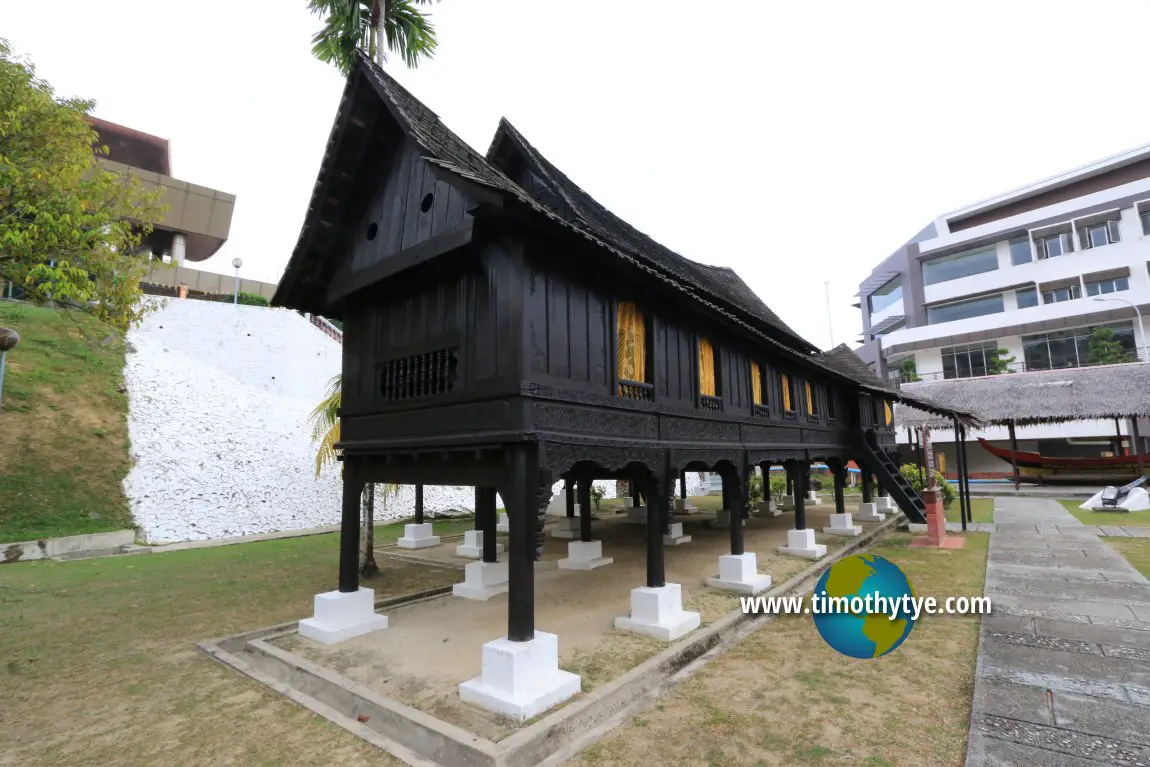 Model Rumah Melayu Negeri Sembilan (9 July, 2016)
Model Rumah Melayu Negeri Sembilan (9 July, 2016)
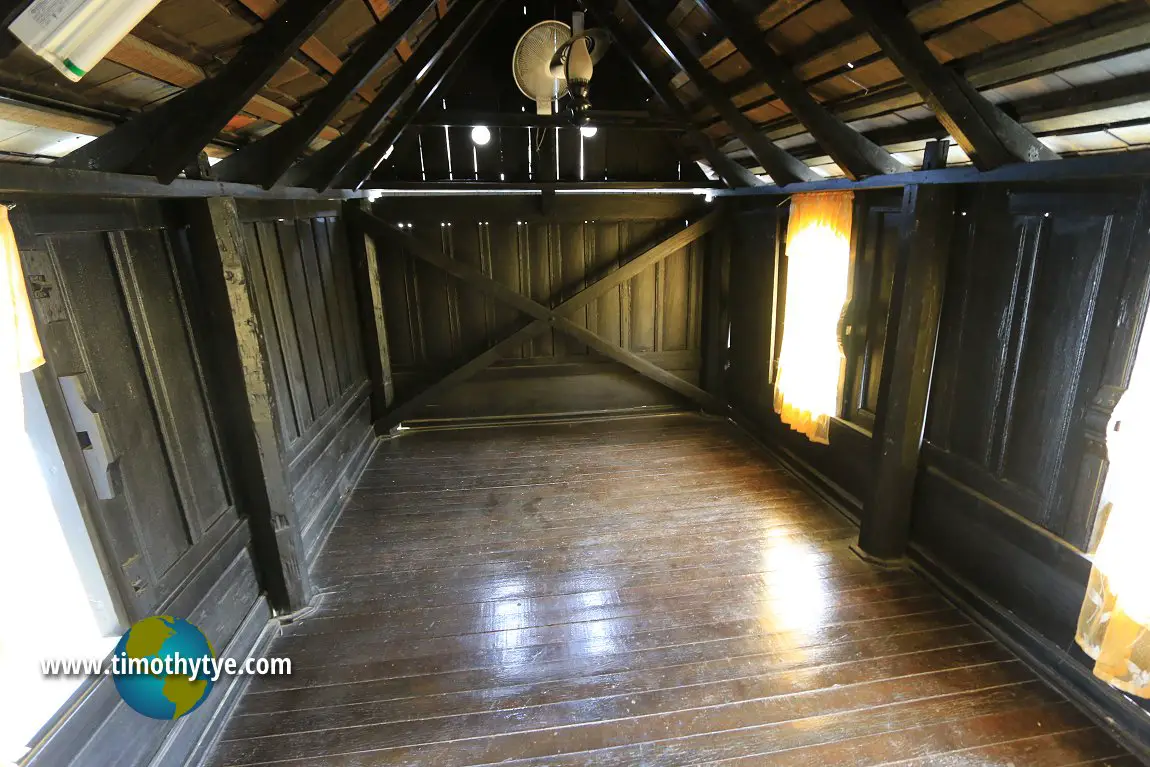 The interior of Model Rumah Melayu Negeri Sembilan is unfurnished (9 July, 2016)
The interior of Model Rumah Melayu Negeri Sembilan is unfurnished (9 July, 2016)
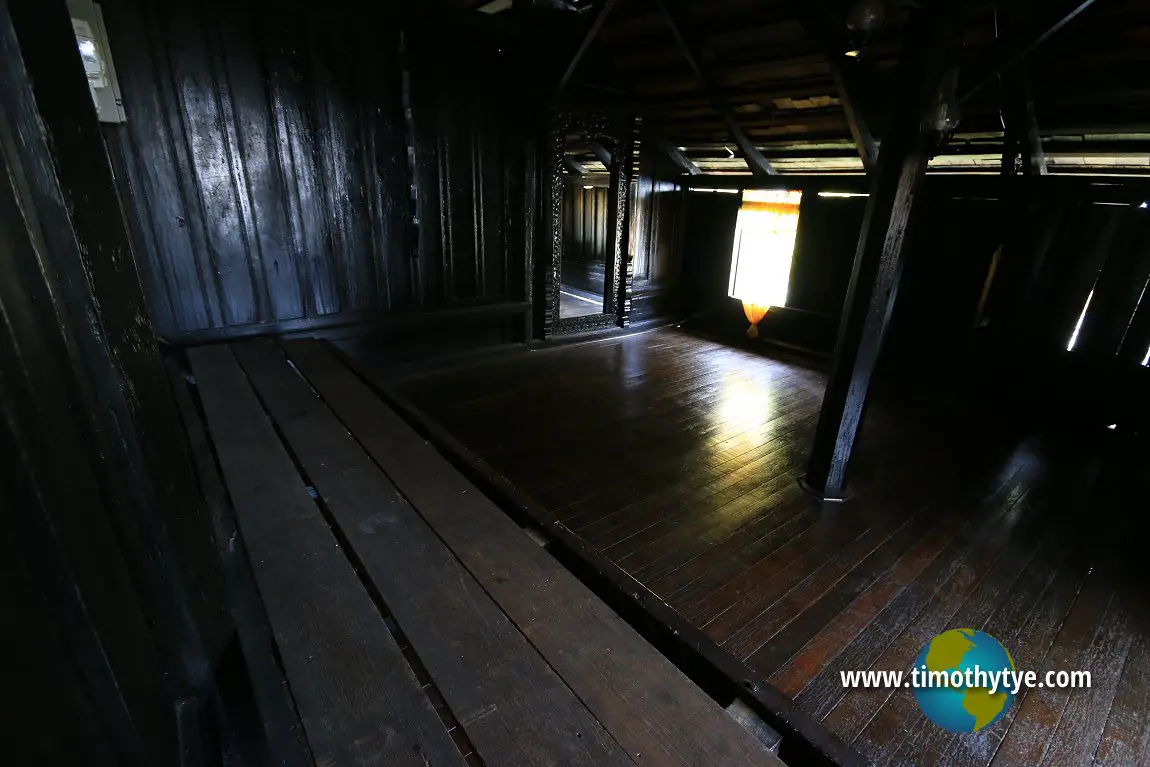 It is very, very dark inside Model Rumah Melayu Negeri Sembilan as the wood is applied with dark lacquer (9 July, 2016)
It is very, very dark inside Model Rumah Melayu Negeri Sembilan as the wood is applied with dark lacquer (9 July, 2016)
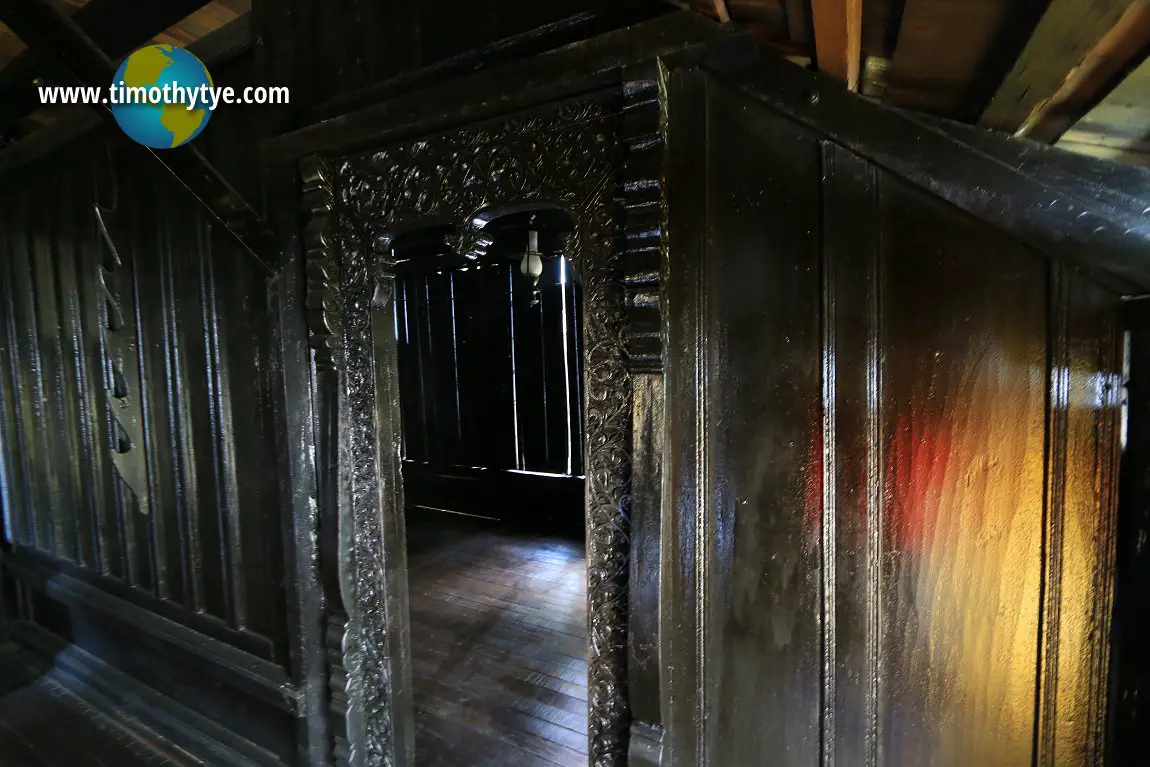 The doorway of Model Rumah Melayu Negeri Sembilan has intricate carvings. (9 July, 2016)
The doorway of Model Rumah Melayu Negeri Sembilan has intricate carvings. (9 July, 2016)
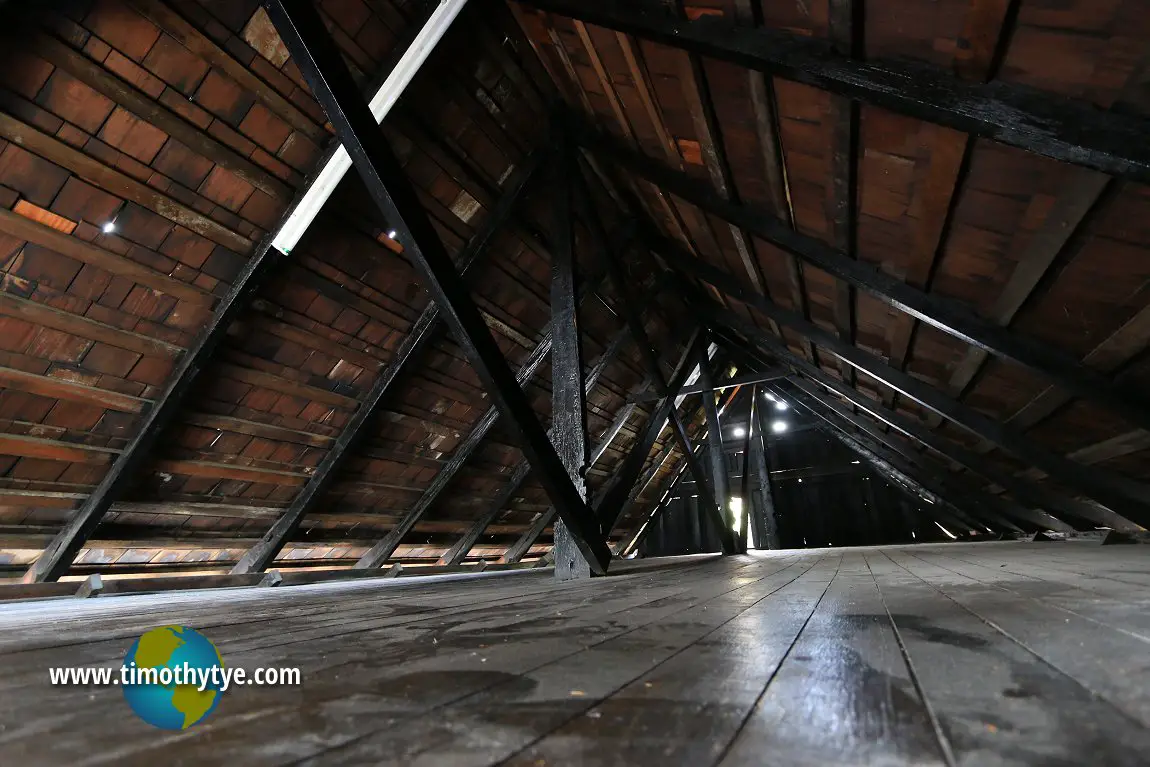 The loft and roof of Model Rumah Melayu Negeri Sembilan (9 July, 2016)
The loft and roof of Model Rumah Melayu Negeri Sembilan (9 July, 2016)
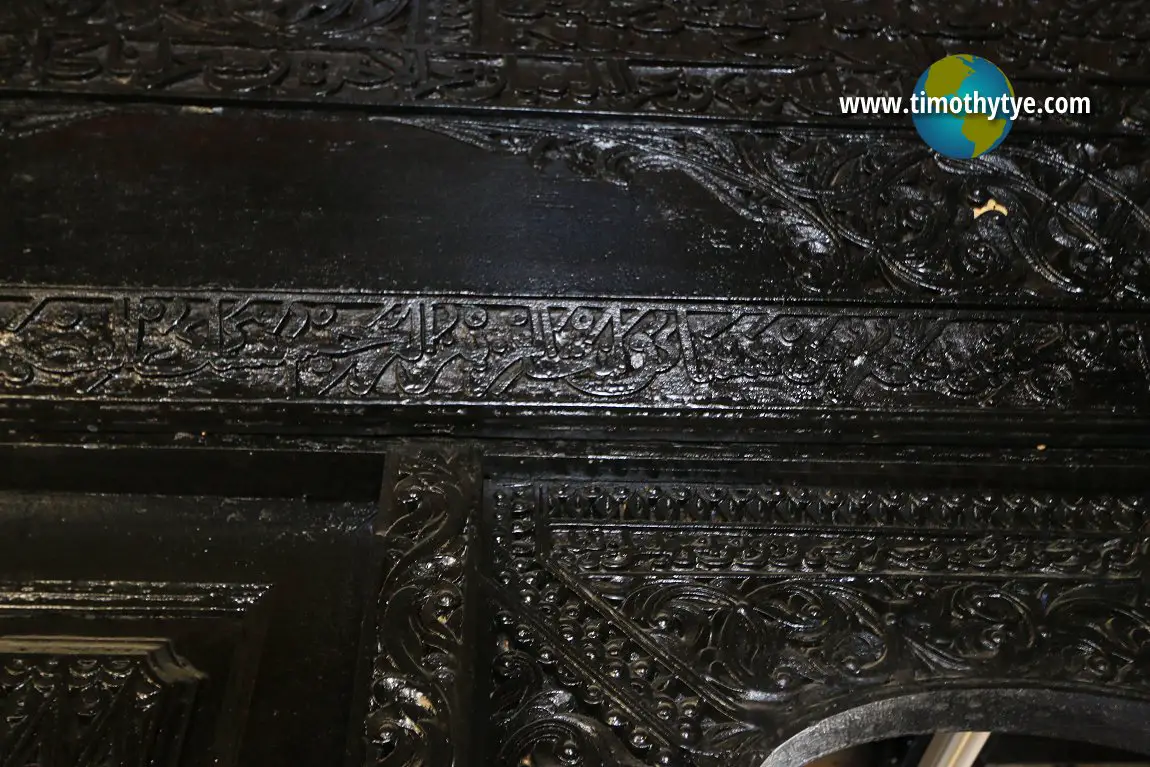 Jawi carvings on the wall of Model Rumah Melayu Negeri Sembilan (9 July, 2016)
Jawi carvings on the wall of Model Rumah Melayu Negeri Sembilan (9 July, 2016)
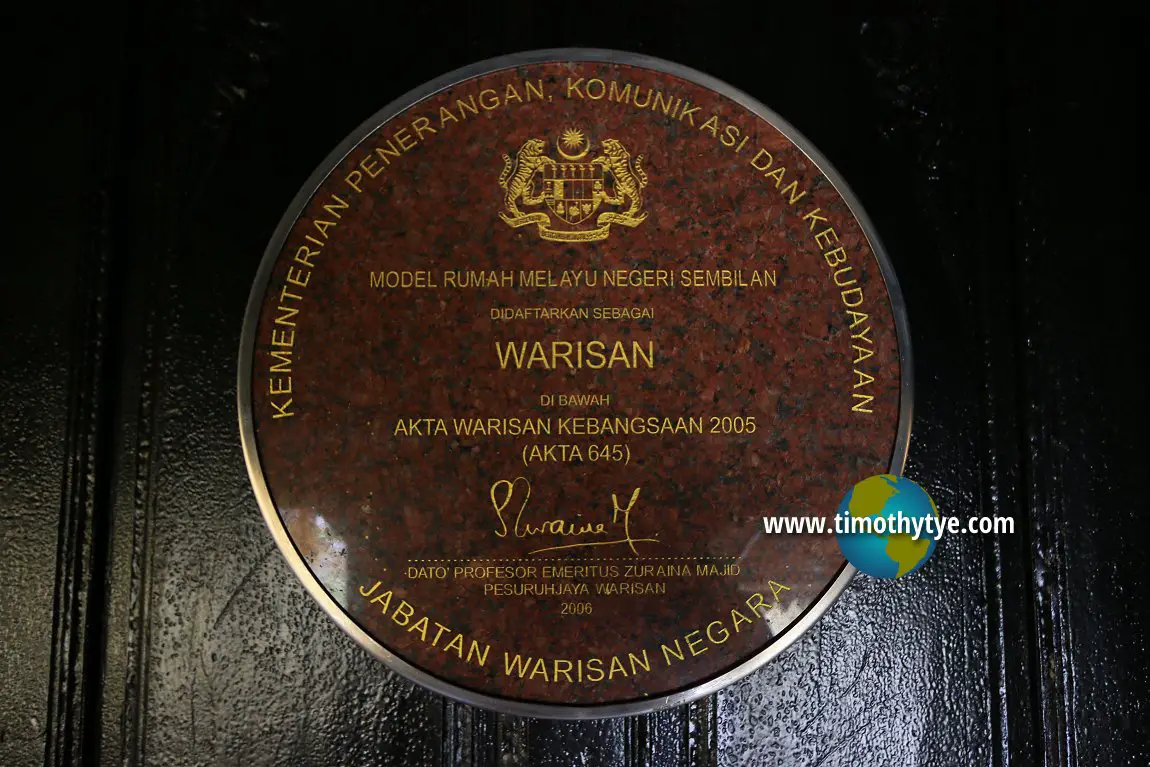 Plaque gazetting Model Rumah Melayu Negeri Sembilan as a heritage building (9 July, 2016)
Plaque gazetting Model Rumah Melayu Negeri Sembilan as a heritage building (9 July, 2016)
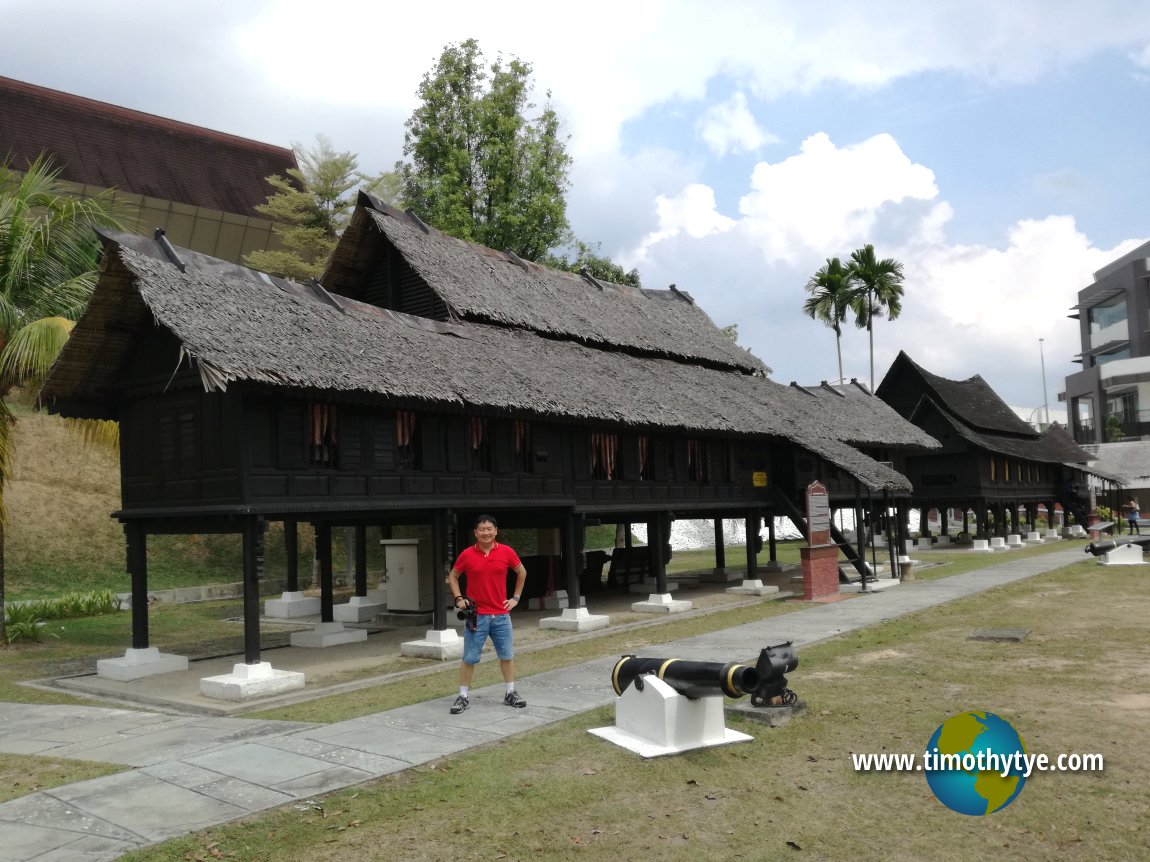 Model Rumah Melayu Negeri Sembilan (9 July, 2016)
Model Rumah Melayu Negeri Sembilan (9 July, 2016)
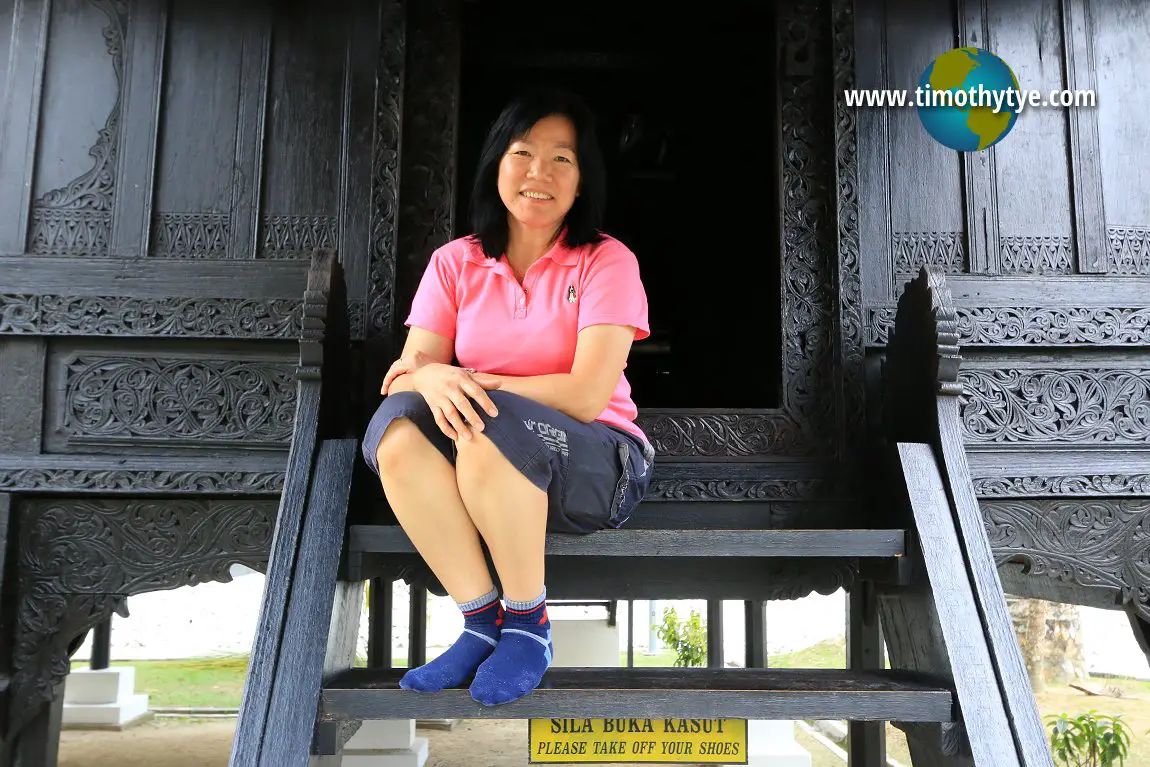 My wife sitting on the staircase of Rumah Model Melayu Negeri Sembilan (9 July, 2016)
My wife sitting on the staircase of Rumah Model Melayu Negeri Sembilan (9 July, 2016)
Negeri Sembilan State Museum on Google Maps Street View
Negeri Sembilan State Museum (Aug 2015)Negeri Sembilan State Museum is  on the Map of Seremban
on the Map of Seremban
Back to Discover Seremban, Negeri Sembilan mainpage; list of the 5 Top Attractions of Seremban
 Latest updates on Penang Travel Tips
Latest updates on Penang Travel Tips

Copyright © 2003-2025 Timothy Tye. All Rights Reserved.

 Go Back
Go Back